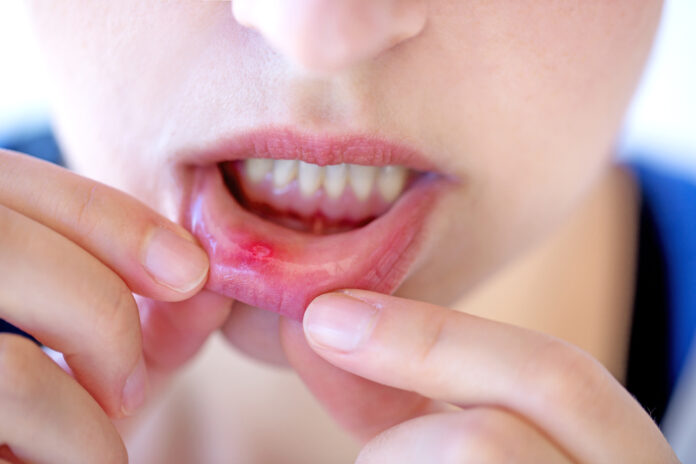
Canker sores are noncontagious ulcers that form inside of your mouth. Canker sores, otherwise known as aphthous ulcers, are small, incredibly painful sores. In fact, their name says it all. Aphthous is derived from the Greek word “aphthae”, meaning to set on fire.
Canker Sores VS. Cold Sores
Unfortunately, a lot of people think canker sores and cold sores are the same things by different names. Though both sores cause pain to the sufferer, that’s where the similarities end.
Cold sores are open, red, and crusty sores on the outer edges of the lips and mouth. Cold sores form when someone has been exposed to the Herpes virus. Cold sores will appear in outbreaks, throughout one’s life. Cold sores never appear on the inside of the mouth.
Conversely, canker sores are invisible to the passerby. Canker sores have a red edge with a grayish-green middle. Canker sores form inside the mouth on soft tissues, such as on the gum line, the lining of the cheek, or the roof of the mouth.
Canker sores have no discernable root cause. There is some evidence that canker sores are genetic. In some, canker sores can appear from environmental factors, like eating acidic foods.
Treating Canker Sores
Canker sores are incredibly painful. They can make simple tasks like talking or eating miserable for the person affected. As such, lots of people want to treat their canker sores as quickly as possible.
There’s no tried-and-true treatment for canker sores. Most canker sores will appear and dissipate within seven days. During that time, there are options to alleviate the pain and keep the sore clean, such as:
- Peroxide rinses, to clean and soothe.
- Saltwater gargles, to irrigate and soothe.
- Numbing gels, to alleviate pain and burning.
- Canker sore patches, which can be applied to the sore and is a form of band-aid to keep it protected.
Preventing Canker Sores
The best way to avoid the pain of a canker sore is to take steps toward prevention. Many canker sores are caused by environmental factors that can be easily changed.
To prevent future canker sores, you may try:
- Cutting back on, or eliminating, highly acidic foods and drinks.
- Switching to a toothpaste with no sodium lauryl sulfate (SLS) in it. SLS is a chemical used in many kinds of toothpaste that may cause canker sores in susceptible individuals.
- Avoid biting or otherwise traumatizing the inside of your mouth.
- Get blood work done to see if your nutrition is in check. Some evidence shows canker sores can be caused by a lack of Vitamin B12, folic acid, or iron.
- Take a supplement with L-Lysine in it, an essential amino acid that may prevent eruptions of canker sores.
Conclusion
Canker sores are no fun for anyone involved. Canker sores are not related to cold sores, and unlike cold sores, they have no root cause. If you have a canker sore that will not heal, several canker sore breakouts in short succession, or canker sores that are larger than average – you can see a dentist and discuss the cause and prevention method for you.
Sources:
Canker Sores 101: Causes & Treatment | Cedars-Sinai
Canker Sore (Aphthous Ulcer): What It Is, Causes & Treatment (clevelandclinic.org)


















